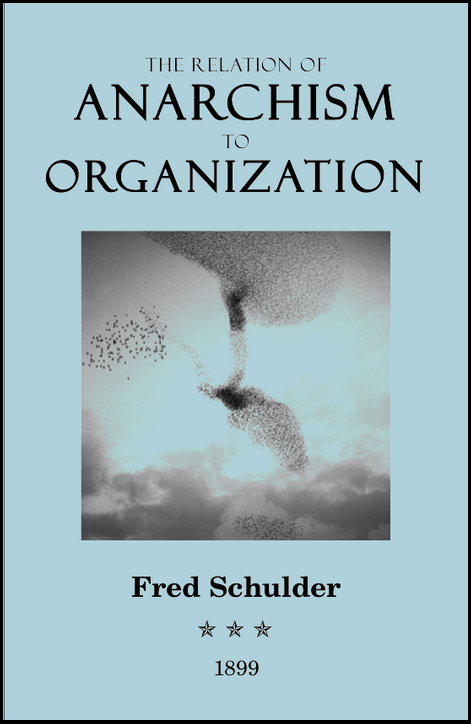C4SS has teamed up with the Distro of the Libertarian Left. The Distro produces and distribute zines and booklets on anarchism, market anarchist theory, counter-economics, and other movements for liberation. For every copy of Fred Schulder’s “The Relation of Anarchism to Organization” that you purchase through the Distro, C4SS will receive a percentage. Support C4SS with Fred Schulder’s “The Relation of Anarchism to Organization“.
$2.00 for the first copy. $1.00 for every additional copy.
“Organization has been defined as the taking on of organic structure. . . . Evolution is a series of changes, under natural law, from a diffused, uniform and indefinite arrangement, to a concentrated, multiform and definite arrangement. . . . Organization proceeds according to the same inevitable laws, and . . . constitutes the evolution, not only of living beings, but also of all communities, societies, and society in general . . . . Organization is the law of life — of development. It is true that in union there is strength, but in organization there is still more strength. . . .
“Anarchism may be defined as the doctrine that the liberty of every individual shall be limited only by the equal liberty of every other. . . . We can find nothing in organization itself, which is a denial of equal liberty. Men [sic] may, and where they find it advantageous, in fact do combine and organize, without being forced to do so. And such organization will persist under liberty, so long as the individuals composing it find it to their advantage. Society at large is such an organization . . . The organization may be in its incipient stage, but the development is going on as fast as antagonistic forces will permit. . . Under liberty, however, this difficulty will continue to grow less; men [sic] will ever more realize their mutual dependence, and this must increase with the development of the social organism. And realizing this mutual dependence, they will adjust these minor differences according to their intelligence – an adjustment which government often prevents. . . .
“What the anarchist objects to in the state is not the Element of organization but the element of government. Through the instrumentality of the state some individuals acquire a monopoly of opportunities, some of which are absolutely necessary to the production of wealth, and others very helpful to it – monopolies which are unthinkable in the absence of government, and which enable their holders to extract from the producer a tribute. Such is the fruit of organized robbery. And again, anarchism is opposed, not to the organization, but to the robbery. While any particular government, according to the laws of organization, tends to grow and become stronger until it loses its adaptation to its surroundings, government in general is losing the adaptation to its surroundings, and is undergoing a change in the direction of dissolution.”
The lecture reprinted in this booklet was originally delivered by Fred Schulder at the Franklin Club, a social and intellectual discussion group in Cleveland, Ohio, on September 18, 1898. The next year, Schulder was persuaded to prepare his club lecture for publication in pamphlet form by his friend, the renowned printer Horace E. Carr.
Fred Schulder (1874-1961) was an individualist anarchist writer, speaker, and sometime traveling salesman — during 1907-1908, he made his living traveling throughout America selling subscriptions to Liberty. Schulder was the companion of fellow anarchist writer Adeline Champney in a non-legal “conscience marriage;” their son, Horace Champney, was an anti-war activist with A Quaker Action Group during the American war on Vietnam. Part of the younger generation of individualists who took on the task of building on the work of Tucker and the Liberty circle, Schulder’s work (like that of William Bailie, Francis D. Tandy,Clarence Lee Swartz, Charles T. Sprading, and Laurance Labadie) drew together the many strands of the radical individualist tradition during the transition of the new century, bringing their new syntheses and developments to bear on problems of property and social development, and exploring the possibilities of consensual social organization and the anti-social, anti-coordinative role of State force.
Schulder’s original pamphlet featured an odd experiment in typesetting: the text on all the pages on the right-hand side of the spine was aligned flush leftwith the spine, with a ragged right margin at the outside edge, much like the text in this paragraph;
but on the other hand, the text on all the left-hand pages was aligned flush right with the spine, with a ragged left margin at the outside, much like the text in this paragraph.
The idea came from Clarence Swartz’s short-lived egoist journal, I, which hoped for an artistic effect from the alternating ragged edges together with the artisanal deckle-edged paper the magazine was printed on. Schulder, oddly, chose to try out Swartz’s deckle-edged alignment even though his own pamphlet did not use deckle-edged paper.
I have not attempted to reproduce this typographical innovation in the new edition.








